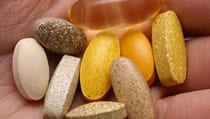People often use the saying “you are what you eat” to encourage others to make healthy food choices. Providing your body with a variety of nutrients lets you feel your best, and may even prevent disease and help you live longer.
Here’s a list of our top 5 nutrients to include into your daily diet.
1. Omega-3s
Many people think that fats are bad for you. While this is true in certain cases, there really are some benefits to them. Omega-3 fatty acids are vital to the maintenance and function of our eyes, brain and nervous system – parts of us that start to weaken with increasing age. In addition, these healthy fats have great ability to fight inflammation that is the cause of painful joints, cardiovascular disease and even wrinkles.
You only need 1-2 grams of them daily, and you can obtain this from sources such as wild-caught fish like salmon, sardines and Arctic char. Plant sources of omega-3s include flax, chia and hemp. It can be difficult to get enough omega-3s from food sources, so supplements are a good alternative. These include eggs, yogurt and a ton of other products on your grocery shelves.
2. Vitamin D
Vitamin D is available to us for free from the sun. Sure, there are foods such as milk and orange juice that have added vitamin D and for some, these foods are a great choice, but for others, it can be hard to ensure you’re getting enough of this essential vitamin through fortified foods.
Elderly people are prone to vitamin D deficiency, and therefore, may experience muscle weakness or impaired intestinal absorption. Everyone, no matter their age, shouldconsider a vitamin D supplement if diet and sun exposure aren’t adequate. From tasteless liquid drops to pills that combine multiple nutrients, there are a variety of options for vitamin D supplementation.
3. Probiotics
Probiotics can fight inflammation, promote digestive health and much more. With age, there is a decrease in the most prominent probiotic in the colon, Bifidobacteria, leaving the colon prone to inflammation, which increases the risk of disease and discomfort.
Foods like kefir and yogurt are common sources of probiotics, but often it’s not enough to get the full benefits. Probiotic supplements are a great way to maintain and rebuild probiotic levels in your digestive tract. Seek out one with lots of different probiotic species. You’ve got hundreds of kinds of probiotics in you. Each probiotic offers its own unique health benefits to your body, so having lots of different kinds in your system can help your body be at its best.
4. Green foods
Greens are packed with more nutrients per bite than almost anything else on your plate. They are full of vitamins, minerals, antioxidants, enzymes and more. The darker the vegetable the better.
The best greens to eat are the ones you like — you don’t have to hate your food. Love your food! Choose some greens that you enjoy and then, once a week, try something outside your comfort zone. If you can’t stomach enough greens, there are plenty of powders available, from simple single ingredient products to complex formulas.
5. Multivitamins
No matter what your age, eating a balanced diet provides your body with plenty of nutrients. Try to ensure that at some point each day you enjoy foods from each color of the rainbow, and artificial coloring doesn’t count.
Taking a multivitamin is one way to ensure your body has the minimum amounts of the essential nutrients it needs each day to function properly. If you are considering a multivitamin, look for one that is designed for your age, activity level and gender.









